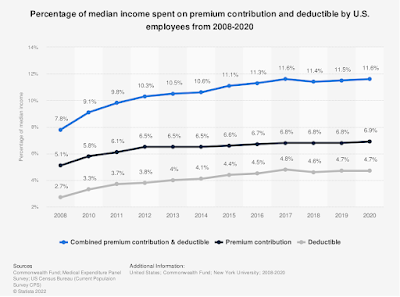Because many people who supported the PPACA, both popularly and derisively known as Obamacare, did so from moral fervor and political partisanship (as did many opponents, often with the added fecal nugget of racism dropped in) they were utterly uninterested in any epistemological or evidence based evaluation for the claims that Obamacare would lower premiums, deductibles, and health care costs.
Supporters took it as an article of faith that Obamacare would do all of those things. And if you questioned that belief or wondered if there were a better way of lowering health care costs, lemming like supporters squealed that you were a dummy, a useful idiot for Republicans, or worst of all some sort of hateful right-wing conservative cretin misogynist misandrist who just wanted people to die.
Silence heretic!!!!
Well.
We have more evidence of how health care costs have changed after a decade of having Obamacare as law. Health care costs haven't gone down. They haven't stayed the same. They have increased.
Health care costs have continued to increase over the past decade despite the landmark passage of Obamacare in March 2010. A recent report from the Commonwealth Fund found that health insurance premiums and deductibles for Americans with employer-sponsored coverage accounted for 11.6% of median income in 2020, a whopping 9.1% increase from 2010.“The findings are a stark reminder of what we already know — that health care costs are rising more quickly than the income for working families,” Sara Collins, vice president for health care coverage and access at The Commonwealth Fund, told Yahoo Finance, “which means health care costs are taking up a larger and larger share of household budgets.” Chris Meekins, a health policy analyst at Raymond James, told Yahoo Finance that the primary drivers of health care costs in the last decade "basically have been hospitals and providers."
On top of that, Meekins explained, the Affordable Care Act requires insurers to submit data to prove they are spending at least 80-85% of premium dollars on medical care, i.e. medical-loss ratio.
"You've got this situation where there's almost an incentive for insurers to raise costs for something," he said, adding: "But that also means on the flip side of that, let's say 15% can be spent on overhead or profit or stock buybacks or all these other things. For that 15% to get bigger, the 85% also needs to get bigger as well."
On top of that, Meekins explained, the Affordable Care Act requires insurers to submit data to prove they are spending at least 80-85% of premium dollars on medical care, i.e. medical-loss ratio.
"You've got this situation where there's almost an incentive for insurers to raise costs for something," he said, adding: "But that also means on the flip side of that, let's say 15% can be spent on overhead or profit or stock buybacks or all these other things. For that 15% to get bigger, the 85% also needs to get bigger as well."
Emily Gee, vice president and coordinator for health policy at the Center for American Progress, told Yahoo Finance that the overall cost inflation occurring in America's insurance company-dominated health care market is a key factor.
“Even though we’re not necessarily using more care, premiums are going up because the overall cost of care is going up,” Gee told Yahoo Finance.
Some people will read this news and say this is proof that we need greater government control of health care. Others will see the same news and reach the opposite conclusion. I can't call it.
A fair review of the evidence might show that health care costs would have increased even MORE without Obamacare. I doubt it, but that is certainly possible. Of course no Obamacare supporter ever said that we should vote for Obamacare because we'd be screwed a little less harshly than otherwise. That's not exactly an exciting slogan is it?
My suspicion is that, contrary to the beliefs of Obamacare supporters, there is no way to require "free" goodies, lower prices, or expanded coverage, without also seeing costs increase for everyone.
The critical point here is that maybe the next time that someone claims that a huge system change is needed, people should be more skeptical of pie in the sky claims. Not every opposing argument is always in bad faith.


